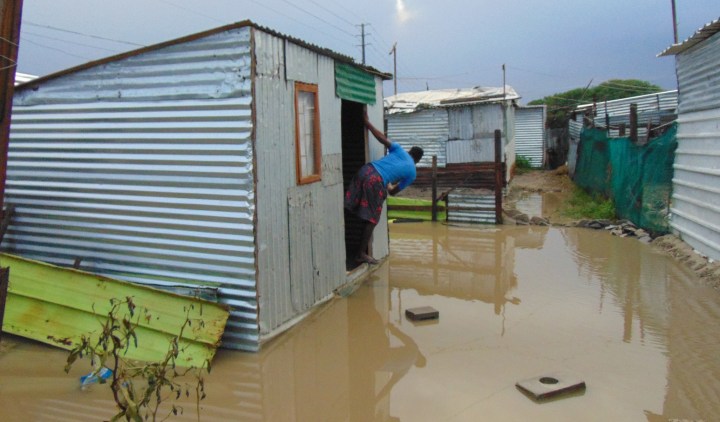GROUNDUP HOUSELESSNESS CRISIS OP-ED
Time to replace the outdated one-plot-one-house model to address SA’s housing crisis

The nation needs to be building much denser cities in order to accommodate housing needs and demands.
With every passing year, South Africa is plunging deeper into the housing crisis.
The housing backlog is growing, and at least 2.5 million families have been estimated to be in need of housing now. Protests, land occupations and hijacking of construction sites are increasing in frequency and violence. Infrastructure for systems such as sewerage and road networks has reached maximum capacity in many of our major cities. Homelessness is on the rise as more households fall deeper into poverty.
The United Nations estimates that the South African population will reach over 65 million people by 2030 and the CSIR forecasts that 75% of this growth will be in cities and large regional centres. Even without this growth, current levels of housing delivery cannot meet existing demand.
Five critical bottlenecks keep the nation trapped in this crisis:
- Municipalities, major role-players in the delivery of public housing, continue to lack technical capacity for delivery at significant scale.
- Use of state land has not been prioritised for affordable and social housing. Instead, priority is often placed on maximising revenue for municipalities and cash-hungry state-owned entities.
- Too little — and declining — levels of state funds have been allocated to housing.
- Simultaneously, the state has made insufficient headway in creating an environment in which civil society (non-profit companies, social enterprises and private businesses) can participate in addressing the problem. These four problems can be addressed under the right leadership, which highlights the fifth problem: There has been no real political champion for low-income housing delivery on the national stage for any reasonable period of time.
So what is to be done about this seemingly intractable problem which is set to intensify over the next decade, as the young population matures and forms new households, and the urbanised population explodes? Clearly, our past strategies have been ineffective and new, more imaginative, solutions are needed. We need to tackle this problem with far more boldness, imagination, innovation, and collaboration.
South Africa still has vast tracts of unserviced land and could build new cities or urban centres. This should be done in ways that take on board lessons from other countries who have done so in modern times, for example Egypt, Malaysia and Brazil, so that we ensure they are safe, inclusive and economically viable.
Such audacious projects require the highest level of inter-governmental cooperation, significant technical competence, wide-ranging buy-in and hefty funds. Unsurprisingly, mega-housing projects have been known to fail because of the complexity involved. Engagement of all sectors of society and tiers of government will be required to minimise the risk of failure.
Land and property in built areas that already have infrastructure and amenities must also be optimised to house larger numbers of households. This solution is as important as building new urban centres. We need to embrace and create far greater densities in all new developments and redevelopments in our existing cities. This must form part of a re-imagined way of urban living in South African cities, a way that must be co-created with citizens.
This is why it is worrying when municipalities, like the Makana Local Municipality in Makhanda, move toward handing over stands in informal settlements to poor households. Low-density housing developments are not a response to the contemporary housing challenges in South African cities. We need to recognise that the time for approaches, such as this, which lead to the perpetuation of low-density housing is long gone.
Moving from the status quo will be challenging. Citizens have been promised and still expect a piece of land with a house and a fence on it. Although the country’s Constitution only recognises housing as a progressive right and not as an absolute right, many citizens regard it as a right to be accessed immediately. This is because of a combination of miseducation, empty promises, and most importantly, because of their fundamental need for shelter and dignity.
A courageous conversation is needed between our political leaders and the citizenry in which we confront the current and growing crisis without sugar-coating the reality. We need leadership, in all sectors of society, who are willing to face up to the challenges and who are prepared to risk failure and unpopularity as they build a new social compact. Without this, we are just arranging the chairs on the deck of a sinking ship. DM
Houston is chief executive of Communicare. Views expressed are not necessarily those of GroundUp.
First published by GroundUp.



















A tiny house on a tiny plot is not a solution for anything: physical and mental health, safety, quality of life etc. Two storey terrace houses could work but there needs to be creative ideas and input from the community. A townhouse model that encloses a big open space might be an option: a safe space to relax, play and grow food. Training community groups to build their own houses rather than a huge company and dodgy tenders. It would foster pride and responsibility, as well as training and employment. And it would be cheaper. The cost of RDP houses defies belief – people could have done better and more if they’d been given the money.